|
|
Sartorius 725030 mLINE mechanical pipette, 1-ch, 2-20 µl |

|
| Sartorius' most advanced mechanical pipette family - the mLINE® - offers excellent ergonomics, performance and safety in manual pipetting more ... |
|
Laboratory Equipment >
Pipettes >
Pipettes
|
|
|
|
|
|
Features
Sartorius most advanced mechanical pipette family - the mLINE® - offers excellent ergonomics, performance and safety in manual pipetting. It is particularly designed for repetitive and long-lasting pipetting in order to prevent work related hand, arm and shoulder disorders or Repetitive Strain Injury (RSI). mLINE® is recommended by health and safety officers around the globe. It covers the full volume range of 0.1 µl to 10 ml and is available in single- and multichannel models.
FEATURES
- Excellent ergonomics to protect from injuries with the exceptionnally light pipetting and tip ejection forces
- High accuracy and precision, also in repetitive, long-lasting pipetting
- Minimised risk of contamination with Safe-Cone Filters and full autoclavability
- Increased safety with volume lock preventing accidental volume changes while pipetting
- Dimensions (WxDxH)- 280 × 85 × 45 mm
Weight:
1.00 lb
|
|
Other Sartorius mLine Mechanical Pipettes
|
|
| |
|
|
* within the 48 continental US States
|
|
Optional Accessories
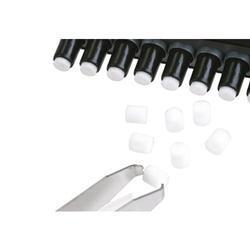
more info
|
Sartorius 721006 Safe-Cone Filter standard Ø 5.33 mm (pack of 50)
The unique and replaceable polyethylene (PE) Safe-Cone Filters act as a final barrier to prevent any fluids and liquid vapours from reaching the internal components of the pipette.
Standard Safe-Cone Filters are for general applications. They can be used for the same type of work as the Plus Filter is recommended for, but need to be changed more frequently.
Self-sealing Plus Safe-Cone Filters are meant for applications such as radioactive work, cell culture, bacterial and virological work and molecular biology.
The interval of changing the filter depends on the application and the sample. However, according to studies, the filter should be changed daily (or after 50 to 250 pipettings) and immediately in case of over-aspiration.
To ensure safety of the user, forceps should be used to change the filter. The mLINE® pipettes also feature a built-in filter ejector. In addition, clean the tip cone with ethanol (70%) prior to assembling a new filter.
FEATURES
- Protects the pipette and the sample from contamination
- Prolongs the pipette’s lifetime
- Reduces maintenance intervals
- Is cost-effective
|
|
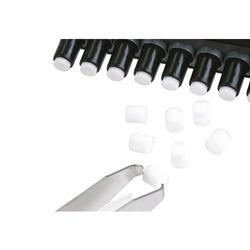
more info
|
Sartorius 721007 Safe-Cone Filter standard Ø 3.15 mm (pack of 50)
The unique and replaceable polyethylene (PE) Safe-Cone Filters act as a final barrier to prevent any fluids and liquid vapours from reaching the internal components of the pipette.
Standard Safe-Cone Filters are for general applications. They can be used for the same type of work as the Plus Filter is recommended for, but need to be changed more frequently.
Self-sealing Plus Safe-Cone Filters are meant for applications such as radioactive work, cell culture, bacterial and virological work and molecular biology.
The interval of changing the filter depends on the application and the sample. However, according to studies, the filter should be changed daily (or after 50 to 250 pipettings) and immediately in case of over-aspiration.
To ensure safety of the user, forceps should be used to change the filter. The mLINE® pipettes also feature a built-in filter ejector. In addition, clean the tip cone with ethanol (70%) prior to assembling a new filter.
FEATURES
- Protects the pipette and the sample from contamination
- Prolongs the pipette’s lifetime
- Reduces maintenance intervals
- Is cost-effective
|
|
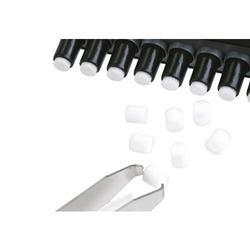
more info
|
Sartorius 721008 Safe-Cone Filter standard Ø 2.51 mm (pack of 50)
The unique and replaceable polyethylene (PE) Safe-Cone Filters act as a final barrier to prevent any fluids and liquid vapours from reaching the internal components of the pipette.
Standard Safe-Cone Filters are for general applications. They can be used for the same type of work as the Plus Filter is recommended for, but need to be changed more frequently.
Self-sealing Plus Safe-Cone Filters are meant for applications such as radioactive work, cell culture, bacterial and virological work and molecular biology.
The interval of changing the filter depends on the application and the sample. However, according to studies, the filter should be changed daily (or after 50 to 250 pipettings) and immediately in case of over-aspiration.
To ensure safety of the user, forceps should be used to change the filter. The mLINE® pipettes also feature a built-in filter ejector. In addition, clean the tip cone with ethanol (70%) prior to assembling a new filter.
FEATURES
- Protects the pipette and the sample from contamination
- Prolongs the pipette’s lifetime
- Reduces maintenance intervals
- Is cost-effective
|
|
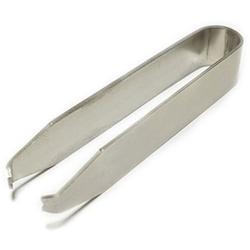
more info
|
Sartorius 721009 Biohit Forceps for Filter Replacement
For using in replacing filters for Pipettes.
|
|
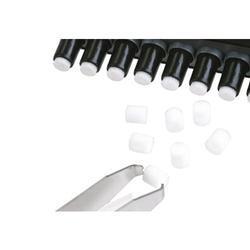
more info
|
Sartorius 721014 Safe-Cone Filter standard Ø 1.83 mm (pack of 50)
The unique and replaceable polyethylene (PE) Safe-Cone Filters act as a final barrier to prevent any fluids and liquid vapours from reaching the internal components of the pipette.
Standard Safe-Cone Filters are for general applications. They can be used for the same type of work as the Plus Filter is recommended for, but need to be changed more frequently.
Self-sealing Plus Safe-Cone Filters are meant for applications such as radioactive work, cell culture, bacterial and virological work and molecular biology.
The interval of changing the filter depends on the application and the sample. However, according to studies, the filter should be changed daily (or after 50 to 250 pipettings) and immediately in case of over-aspiration.
To ensure safety of the user, forceps should be used to change the filter. The mLINE® pipettes also feature a built-in filter ejector. In addition, clean the tip cone with ethanol (70%) prior to assembling a new filter.
FEATURES
- Protects the pipette and the sample from contamination
- Prolongs the pipette’s lifetime
- Reduces maintenance intervals
- Is cost-effective
|
|
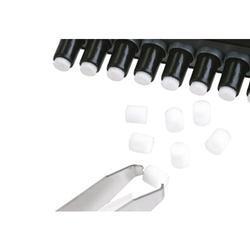
more info
|
Sartorius 721015 Safe-Cone Filter plus Ø 6.73 mm (pack of 50)
The unique and replaceable polyethylene (PE) Safe-Cone Filters act as a final barrier to prevent any fluids and liquid vapours from reaching the internal components of the pipette.
Standard Safe-Cone Filters are for general applications. They can be used for the same type of work as the Plus Filter is recommended for, but need to be changed more frequently.
Self-sealing Plus Safe-Cone Filters are meant for applications such as radioactive work, cell culture, bacterial and virological work and molecular biology.
The interval of changing the filter depends on the application and the sample. However, according to studies, the filter should be changed daily (or after 50 to 250 pipettings) and immediately in case of over-aspiration.
To ensure safety of the user, forceps should be used to change the filter. The mLINE® pipettes also feature a built-in filter ejector. In addition, clean the tip cone with ethanol (70%) prior to assembling a new filter.
FEATURES
- Protects the pipette and the sample from contamination
- Prolongs the pipette’s lifetime
- Reduces maintenance intervals
- Is cost-effective
|
|
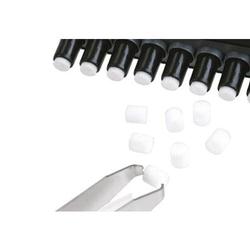
more info
|
Sartorius 721016 Safe-Cone Filter plus Ø 5.33 mm (pack of 50)
The unique and replaceable polyethylene (PE) Safe-Cone Filters act as a final barrier to prevent any fluids and liquid vapours from reaching the internal components of the pipette.
Standard Safe-Cone Filters are for general applications. They can be used for the same type of work as the Plus Filter is recommended for, but need to be changed more frequently.
Self-sealing Plus Safe-Cone Filters are meant for applications such as radioactive work, cell culture, bacterial and virological work and molecular biology.
The interval of changing the filter depends on the application and the sample. However, according to studies, the filter should be changed daily (or after 50 to 250 pipettings) and immediately in case of over-aspiration.
To ensure safety of the user, forceps should be used to change the filter. The mLINE® pipettes also feature a built-in filter ejector. In addition, clean the tip cone with ethanol (70%) prior to assembling a new filter.
FEATURES
- Protects the pipette and the sample from contamination
- Prolongs the pipette’s lifetime
- Reduces maintenance intervals
- Is cost-effective
|
|
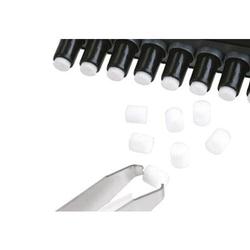
more info
|
Sartorius 721017 Safe-Cone Filter plus Ø 3.15 mm (pack of 50)
The unique and replaceable polyethylene (PE) Safe-Cone Filters act as a final barrier to prevent any fluids and liquid vapours from reaching the internal components of the pipette.
Standard Safe-Cone Filters are for general applications. They can be used for the same type of work as the Plus Filter is recommended for, but need to be changed more frequently.
Self-sealing Plus Safe-Cone Filters are meant for applications such as radioactive work, cell culture, bacterial and virological work and molecular biology.
The interval of changing the filter depends on the application and the sample. However, according to studies, the filter should be changed daily (or after 50 to 250 pipettings) and immediately in case of over-aspiration.
To ensure safety of the user, forceps should be used to change the filter. The mLINE® pipettes also feature a built-in filter ejector. In addition, clean the tip cone with ethanol (70%) prior to assembling a new filter.
FEATURES
- Protects the pipette and the sample from contamination
- Prolongs the pipette’s lifetime
- Reduces maintenance intervals
- Is cost-effective
|
|
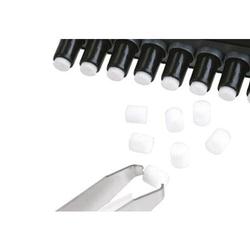
more info
|
Sartorius 721018 Safe-Cone Filter plus Ø 2.51 mm (pack of 50)
The unique and replaceable polyethylene (PE) Safe-Cone Filters act as a final barrier to prevent any fluids and liquid vapours from reaching the internal components of the pipette.
Standard Safe-Cone Filters are for general applications. They can be used for the same type of work as the Plus Filter is recommended for, but need to be changed more frequently.
Self-sealing Plus Safe-Cone Filters are meant for applications such as radioactive work, cell culture, bacterial and virological work and molecular biology.
The interval of changing the filter depends on the application and the sample. However, according to studies, the filter should be changed daily (or after 50 to 250 pipettings) and immediately in case of over-aspiration.
To ensure safety of the user, forceps should be used to change the filter. The mLINE® pipettes also feature a built-in filter ejector. In addition, clean the tip cone with ethanol (70%) prior to assembling a new filter.
FEATURES
- Protects the pipette and the sample from contamination
- Prolongs the pipette’s lifetime
- Reduces maintenance intervals
- Is cost-effective
|
|
|
|
|
|
|
|
|

